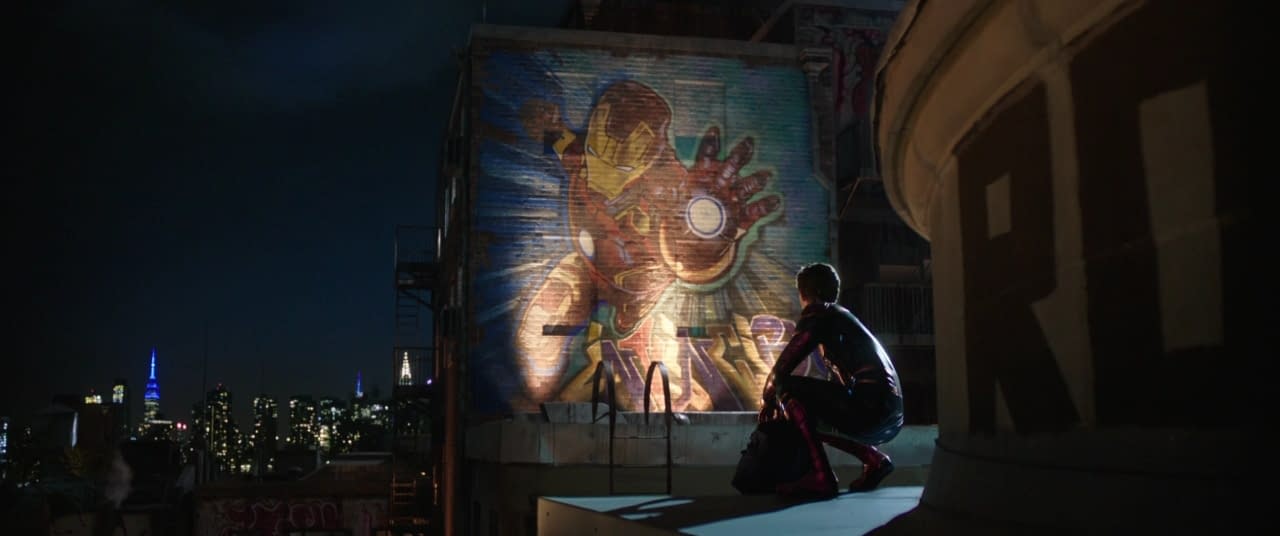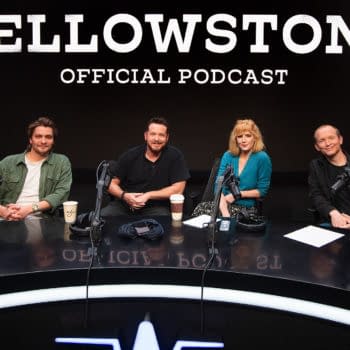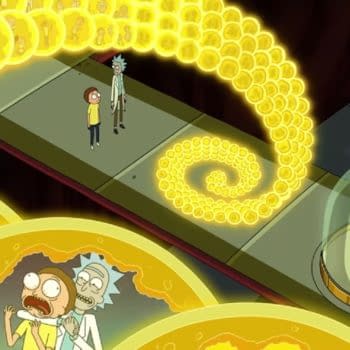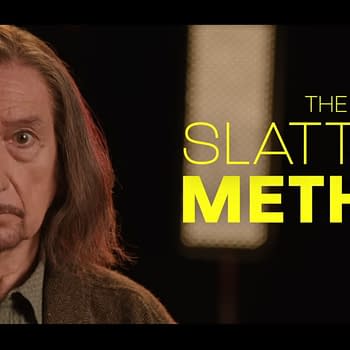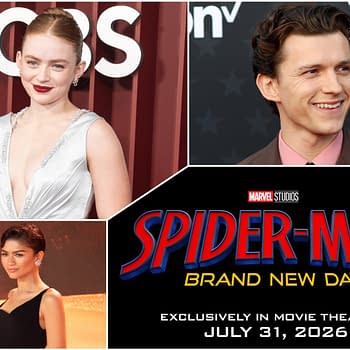Posted in: Movies, Sony, Spoilers | Tagged: movies, sony, spider-man, spider-man: far from home
[SPOILERS] Spider-Man: Far From Home's Dire Warning about Election 2020 [OPINION]
Before we go any further, this post will contain major SPOILERS from Spider-Man: Far From Home and its after-credits scenes, especially as they relate to Mysterio/Quentin Beck (Jake Gyllenhaal). But, it's been a few weeks since this came out and the general spoiler statute of limitations has lifted, so it's time to talk about that after-credits scene. But, if you don't want spoilers, go read this great spoiler-free review right here.
Another warning? This post is going to get political. If you're one of those special snowflakes who doesn't like to hear someone say something negative about Dear Leader, then this may not be the Spider-Man article for you.
Ok, we clear on that? Good. Onward and upward.
Spider-Man: Far From Home isn't exactly a political movie. But some of what happens in its third act and after-credits scenes shine an incredibly prescient light on what's happening in our world today. Just as Homecoming's Vulture provided a great indictment of how "the little guy" feels stepped on by Tony Stark and the 1% and the grievance they feel about that (it's not the point of the movie, but it makes a sharp point), so too does Far From Home offer a dire warning to us. It also comes to us from this film's villain, Quentin Beck aka Mysterio.

The Spoilers
Beck's "superpowers" are anything but. He uses holograms and sophisticated drones to simulate attacks, which he, then, conveniently, stops. It's essentially what Walter Peck accused Peter Venkman of doing. ("Did you guys ever see that really old movie, Ghostbusters?") It's what conspiracy theorists refer to as "false flag" operations.
It's meant to manipulate people into making Beck a hero, so he will get the microphone and be the one everyone listens to. As our Editor-in-Chief Kaitlyn Booth pointed out to me, it's really similar to Gyllenhaal's role in Nightcrawler, but with far less spandex and fisticuffs.
But after Spider-Man foils Mysterio's attack on London, with his final breaths, Quentin Beck tells our friendly neighborhood webslinger, "They'll see what I want them to see."
And so see they do. But with no trusted arbiter– no Avengers, no S.H.I.E.L.D, no Tony Stark — people are left wondering exactly what happened in London.
![[SPOILERS] Spider-Man: Far From Home's Dire Warning about Election 2020 [OPINION]](https://mlpnk72yciwc.i.optimole.com/cqhiHLc.IIZS~2ef73/w:auto/h:auto/q:75/https://bleedingcool.com/wp-content/uploads/2019/04/spiderman.farfromhome.mj_.spidey.jpg)
Cut to the after-credits scene a few days later as Peter and MJ take a leisurely/terrifying swing through Manhattan, stopping in front of a giant jumbotron. The news anchor warns his audience about what they're about to see, and then. . . passes the mic to a guy who seems to have all the answers– J. Jonah Jameson (of course it had to be J. K. Simmons!)
Not only is he on his normal "Spider-Man is a menace!" schtick, but this time he's gone completely Alex Jones — and The Daily Bugle has been transformed from a New York Post tabloid-style daily paper into a conspiracy website.
JJ plays a message from "a hero" Quentin Beck who says Spider-Man attacked him and was behind the attack on London using Stark tech. In a final coup de grace, he reveals Spider-Man's identity as Peter Parker.
"They'll see what I want them to see."
Beck has the final revenge, as he knows exactly the world he's dealing with. The power vacuum left by loss of several of The Avengers allows him to manipulate people in ways heretofore unseen. The deep psychological torture and manipulations he places on Spider-Man (in some of the film's best action and special effects sequences– WTF?!?! ZOMBIE Iron Man?!?!) shows exactly how devious and manipulative he is. And he also knows he's manipulating a kid who just lost his mentor and doesn't know how to step up in his absence.
The world doesn't know either. And in this way, this mirrors our world to an incredible degree. People place trust in major public institutions like government, the press, and even each other at all-time lows thanks to increasing political polarization, rise of social media, and other factors.
Deepfakes, FaceApp, and Russians, oh my!
Media manipulation is about to take a dramatic new turn with the rise of AI. So-called "deepfakes" are artificial-intelligence-enhanced photos and videos that can make someone with a greenscreen and a reasonable resemblance to someone else look just like that person. These deepfakes have already successfully punked Mark Zuckerberg, when a user uploaded a fake video of Zuck to Instagram talking about James-Bond-levels of supervillainy by exploiting the world's personal information. And, while not technically a deepfake, but more of a "dumbfake," a recent video of Nancy Pelosi was slowed down to make it appear she was slurring her words and drunk.
The technology is new, but the practice isn't. Video has always been used to manipulate truth through selective editing or even lighting and basic special effects. So we shouldn't be surprised that in a world where anyone can use Adobe Aftereffects and livestream to Twitch or YouTube that eventually the technology to make anyone be able to look like anyone wasn't too far behind.
And then, in a fit of perfectly timed irony, suddenly all your friends started posting pictures of themselves from FaceApp, now looking old. (PS- what kind of masochists are you people? Make me look younger and thinner, please, not older!) Then all the security concerns came out. FaceApp had, hidden in its terms of service, all sorts of access to your photos and personal information. To be fair, so do most apps– remember that Cambridge Analytics got access to personal data through quizzes hosted on Facebook.
But then we also found out just how viral FaceApp had gone, getting access to hundreds of millions of peoples' faces. Its data was also being stored on Russian servers, and, given current security concerns, the DNC issued a directive to all candidates to not use FaceApp. Not that they should be worried, like Russians didn't hack DNC and presidential candidate emails. No, nothing like that.
The point is, we should be concerned about this. Our world is really not all that different from Quentin Beck's.
Passing the Mic, Drinking the Sand
Even worse, this makes it increasingly easy for people who understand the media, like Quentin Beck and J. Jonah Jameson, to manipulate it. All you have to do is appear to be the smartest one in the room and have something to say.
In one of my favorite films, The American President, Michael J. Fox tells the president (Michael Douglas):
"People want leadership, Mr. President, and in the absence of genuine leadership, they'll listen to anyone who steps up to the microphone. They want leadership. They're so thirsty for it they'll crawl through the desert toward a mirage, and when they discover there's no water, they'll drink the sand."
"People don't drink the sand because they're thirsty. They drink the sand because they don't know the difference."
We're thirsty. We need heroes. We need someone to step up to the mic and make sense of the chaos. Unfortunately, many of those mic-holders are narcissistic man-babies with the cognitive ability and emotional control of a toddler. Yes, I was still talking about Alex Jones. Who did you think I was talking about? Ok, them, too.
The problem, as we march closer and closer to next year's election is that we will increasingly be buffeted by false information. And this time it won't just be "fake news" from garbage websites, but also incredibly real looking videos and online platforms almost entirely devoted to spreading lies.
Molly Weasley's Solution
So, what the crap do we do? Destroy our phones, go live in the mountains cut off from technology? Ok, maybe. But how would you read Bleeding Cool? #Priorities, people.
Politicians have proposed legislation that would ban deepfakes as a means of defamation. Good luck with that, since trolls and foreign intelligence agencies will totally obey our laws, right? Some of the pioneers of the AI that makes deepfakes possible are proposing countermeasures that would help make them easier to detect. That's great and all, but, as Mark Twain once said, "A lie will circle the world twice before the truth even finished lacing up its shoes." You know what? He actually didn't say that, but it's a popular quote mis-attributed to him. #Irony.
Near the end of Harry Potter and the Chamber of Secrets, Molly Weasley is chiding her daughter Ginny for becoming enraptured by Tom Riddle's Diary. (Sorry, spoilers for Harry Potter Book 2? Is that even necessary?) She tells her, in essence, "Don't ever trust anything that speaks where you can't see its eyes."
We need to start doing the same thing. Even when we can see its eyes, as in a deepfake, we still need to be skeptical.
The fault, dear readers, is not in our technology, but in ourselves. We are too quick to believe things that seem true because they fit our predetermined narratives. How do you feel about politics? The Last Jedi? Justice League? Depending on your "side," you're far more likely to believe a rumor or horrible clickbait article that is designed to play on your fears and desires? "Donald Trump Indicted" "Rian Johnson Star Wars Trilogy Plot Details Revealed" "Snyder Cut Getting Released"
Don't believe any of it. These days, it's better to be skeptical of everything first, then confirm. We need to confront our own biases, and then ask ourselves a few basic questions:
1- Is this information coming from a reliable source?
2- Is this information being manipulated to make me feel a certain way?
3- What motivation does someone have for posting this?
Especially if something is making you angry, or overjoyed, or just generally playing on your emotions, resist the urge to share it. Virality is often based on outage, and these sly practitioners of modern media are relying on that dopamine or adrenaline rush you get as they tickle your lizard brain.
Don't Stop Believin'
So, what do we do? Just disbelieve every new piece of information that we come across? Yes and no. It's important to be skeptical, but it's just as important to then take it to the next level and simply develop a very finely-tuned bullshit detector.
But what's really going to save us is not technology or healthy skepticism– it's people. Most of what is making us so upset in media, both regular and social, is about being divisive. It's about putting us into warring camps and getting us to rage at each other. It makes sense– it's in our DNA as descendants of early hunter-gatherer tribes and as intensely social creatures to want to find "our group." That tribalism can be both good and bad, as often our groups that we associate ourselves with give us a feeling of security, acceptance, and love. And we all need those things.
But to overcome this tribalism, we need to just go out and be with people more often. Hang out with friends and read comics, go to the movies, take a walk in the park and feed the ducks, start a board game night or LARP group. Expand your reach outside of your normal social circle. You'll probably find people with whom you disagree on some things but with whom you're incredibly happy to be social with. I truly believe if we all played some D&D with people of differing opinions, we could get past the outrage and recriminations and start treating each other like people again.
Technology is going to try to divide us. It's going to try to trick us. But if we can all try to remember our own, and others' humanity — and figure out how to tell truth from bullshit — we can maybe make it through. I have hope. I believe in heroes like Spider-Man.



